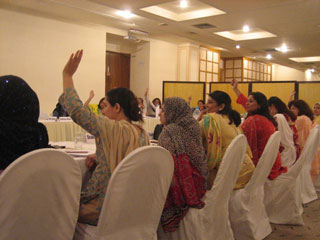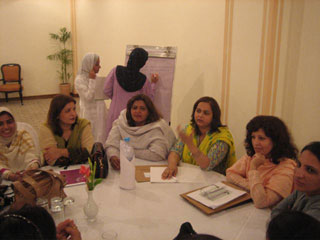Nina Sughrue and Linda Bishai of the Education and Training Center/International conducted a workshop in Islamabad for Pakistani women leaders on negotiation and problem solving, in conjunction with local think tank the Sustainable Development and Policy Institute (SDPI), May 20-22, 2008. The women hailed from Islamabad, Lahore, Peshawar, and Quetta, and were from a wide range of backgrounds - NGOs, academia, and private sector.
Nina Sughrue and Linda Bishai of the Education and Training Center/International conducted a workshop in Islamabad for Pakistani women leaders on negotiation and problem solving, in conjunction with local think tank the Sustainable Development and Policy Institute (SDPI), May 20-22, 2008. The women hailed from Islamabad, Lahore, Peshawar, and Quetta, and were from a wide range of backgrounds - NGOs, academia, and private sector. All were leaders in their organizations seeking to improve their leadership skills in order to achieve their professional goals more effectively. This was the third such workshop USIP has conducted in conjunction with SDPI.
A robust role for civil society is critical to ensure Pakistan's stability, and the role of women leaders in civil society will be particularly important. That said, despite significant awareness on the role of women in governance, civil society and the corporate sector, Pakistani women continue to struggle for real empowerment, and an end to discrimination. The workshop objectives therefore were to strengthen participants' leadership skills, such as recognizing different conflict styles, how gender issues affect negotiation, how female negotiators can maximize their effectiveness in Pakistani society, and how to problem-solve around barriers that are preventing women from achieving their professional goals.
Upon the completion of the workshop, participants emphasized that they had gained skills directly relevant to both their professional and personal lives. Among their comments were: "This has been the most thorough exercise on negotiation skills I have ever attended...the 'women-only' environment provided an opportunity to express our ideas freely. This would not have been possible in a coed environment." "This was an excellent workshop. I received skills and theoretical concepts of conflict and negotiation." "This workshop is very effective and useful for us. As working women we have to face a lot of conflict during our work and such training conducted in a positive environment with very skilled resource persons will be useful to prevent and resolve conflicts in our working places and will help us hone our leadership skills."

The workshop was favorably covered in Pakistani English-language newspapers The Post and The Nation.



